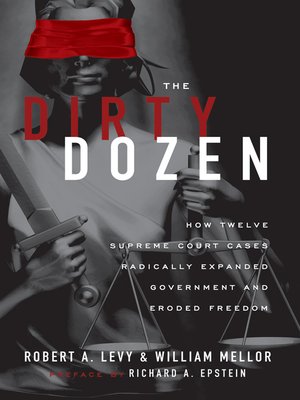The Dirty Dozen
ebook ∣ How Twelve Supreme Court Cases Radically Expanded Government and Eroded Freedom
By Robert A. Levy

Sign up to save your library
With an OverDrive account, you can save your favorite libraries for at-a-glance information about availability. Find out more about OverDrive accounts.
Find this title in Libby, the library reading app by OverDrive.



Search for a digital library with this title
Title found at these libraries:
| Library Name | Distance |
|---|---|
| Loading... |
Alexander Hamilton wrote that "the judiciary, from the nature of its functions, will always be the least dangerous to the political rights of the Constitution." If only that were true. The Founding Fathers wanted the judicial branch to serve as a check on the power of the legislative and executive, and gave the Supreme Court the responsibility of interpreting the Constitution in a way that would safeguard individual freedoms. In some cases, like Brown V. Board of Education and United States V. Lopez, the Court fulfilled its role, protecting us from racial discrimination and the heavy hand of the federal government.
But sadly, the Supreme Court has also handed down many destructive decisions on cases you probably never learned about in school. In The Dirty Dozen, two distinguished legal scholars shed light on the twelve worst cases, which allowed government to interfere in your private contractual agreements; curtail your rights to criticize or support political candidates; arrest and imprison you indefinitely, without filing charges; and seize your private property, without compensation, when someone uses the property for criminal activity—even if you don't know about it!
This is not a book just for lawyers. It's for all Americans who want to understand how the Supreme Court can affect our right to life, liberty, and the pursuit of happiness. This paperback edition includes a new preface, "Guns, Bailouts, and Empathetic Judges," which highlights new and critical issues that have arisen since the book's initial edition was published in 2008.







